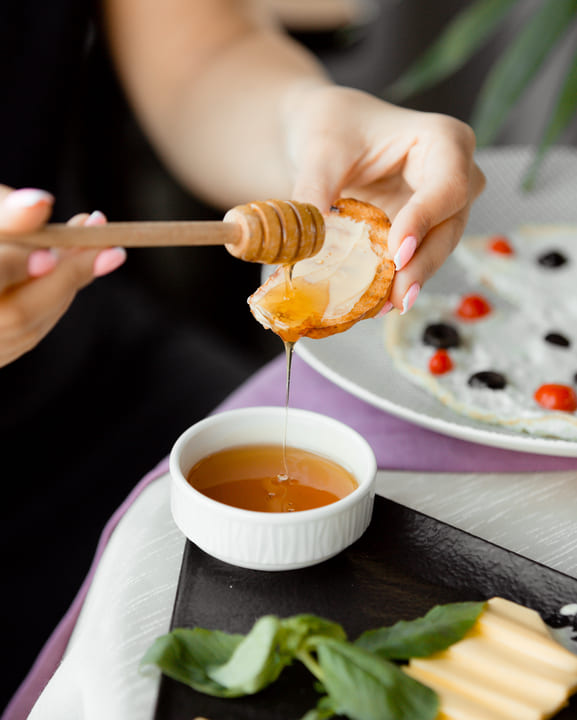In a city like Bangalore, where health-conscious individuals are on the constant lookout for healthier alternatives, Jayashree’s case stood out. A vibrant, 45-year-old woman with a sweet tooth and a diagnosis of diabetes, Jayashree’s journey towards managing her condition while still savoring life’s simple pleasures became a fascinating study. As a practicing Ayurvedic professional with a deep-rooted interest in holistic wellness, I’ve encountered numerous cases that challenge the conventional wisdom surrounding dietary choices for diabetic patients. One such question that frequently pops up is: Can diabetic patients consume honey? Let’s delve into this sticky topic and uncover the science, myths, and practical implications.
Honey and Diabetes: Unraveling the Sweet Truth
The Nectar’s Nutrient Profile
I know you might be wondering, “Isn’t honey a healthier substitute for sugar?” Jayashree’s case propelled me to explore this query further. Honey, a natural sweetener, boasts an intricate nutrient profile that includes enzymes, antioxidants, vitamins, and minerals. Its unique blend of glucose and fructose grants it a lower glycemic index compared to table sugar, suggesting a slower impact on blood sugar levels.
The Jayashree Dilemma: A Case Study
Let’s take a closer look at Jayashree’s experience. An avid baker and fitness enthusiast, she was concerned about how her passion for honey-infused treats might affect her diabetic condition. Consulting with her Ayurvedic doctor, she embarked on a cautious journey of self-experimentation. Monitoring her blood glucose meticulously, Jayashree noted interesting patterns. When she substituted refined sugar with honey in her recipes, her post-meal blood sugar spikes were less pronounced. However, this didn’t grant her carte blanche to indulge.
Dispelling Common Myths: Honey and Diabetes
Myth #1: Honey is Diabetes-Friendly
In the realm of diabetes management, the term “diabetes-friendly” often gets misconstrued. While honey does have a lower glycemic index, implying a slower sugar release, it still elevates blood sugar levels. It’s crucial to recognize that moderation is the key.
Myth #2: Honey Doesn’t Raise Blood Sugar
Contrary to popular belief, honey does elevate blood sugar levels. The presence of natural sugars means it should be approached with caution. Jayashree’s experience revealed that portion control played a pivotal role in managing her post-consumption blood sugar spikes.
Patients’ Asked Questions: All About Honey and Diabetes
1: Can I use honey as a sugar substitute in my coffee?
Absolutely, but be mindful of the quantity. A teaspoon of honey adds flavor without causing drastic blood sugar fluctuations.
2: Is raw honey better than processed honey for diabetics?
Raw honey retains more antioxidants and enzymes, making it a slightly healthier choice. However, the impact on blood sugar remains a concern regardless of the type.
3: Can honey cure diabetes?
Unfortunately, no. Diabetes is a complex metabolic condition. While honey offers potential health benefits, it’s not a cure.
4: How often can I consume honey if I have diabetes?
Moderation is key. Integrate honey sparingly into your diet, keeping track of its impact on your blood sugar levels.
5: Are there any benefits of honey for diabetics?
Some studies suggest that honey might possess antioxidant and anti-inflammatory properties. However, these potential benefits need further research.
6: What’s the best time to consume honey for diabetics?
Consuming honey in the context of a balanced meal might minimize its impact on blood sugar levels.
7: Can honey be a part of a diabetic’s breakfast?
Yes, but it’s advisable to pair it with high-fiber foods like whole grains or yogurt to mitigate its glycemic effects.
8: Are there any risks associated with consuming honey for diabetics?
Excessive honey consumption can lead to calorie overload and undesirable blood sugar spikes. Consult your doctor for personalized guidance.
9: Does honey offer any advantages over regular sugar?
Honey’s nutrient content and lower glycemic index make it a slightly better choice than table sugar, but it should still be consumed mindfully.
10: Should I consult my doctor before adding honey to my diet?
Absolutely. Every individual’s diabetes management plan is unique. Your doctor can offer personalized advice based on your medical history.
Navigating the Honey Terrain: A Balanced Perspective
In the journey of managing diabetes, Jayashree’s story exemplifies the importance of individualized approaches. While honey might have its merits, it’s crucial to remember that no single food can guarantee a diabetes-free life. Moderation, portion control, and mindful consumption remain paramount.
As we conclude this exploration of honey’s place in a diabetic’s diet, let’s embrace a holistic outlook. Including a touch of honey here and there can undoubtedly elevate your culinary experiences, but it shouldn’t overshadow the broader commitment to a well-balanced lifestyle. In Jayashree’s words, “Diabetes taught me to savor life’s sweetness in more ways than one, and honey, in moderation, is just one delightful part of it.”


1 comment
[…] them better manage their blood sugar levels. They report feeling more satisfied after meals and experiencing fewer cravings for sugary snacks. One patient, Ramakrishna, shared, “After I started using multigrain atta for my rotis, I […]